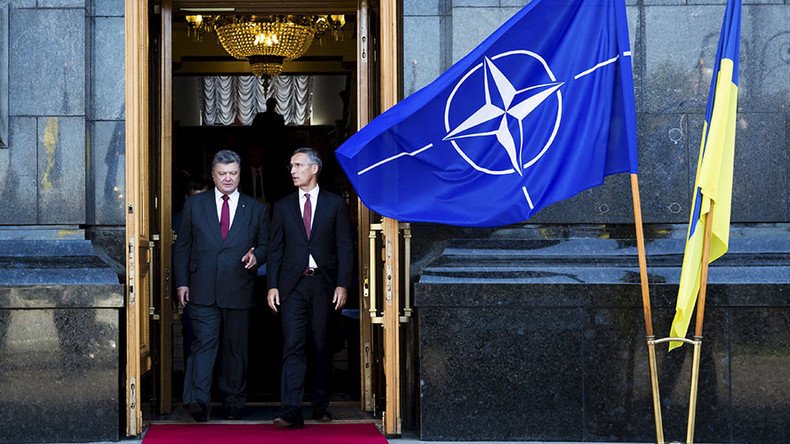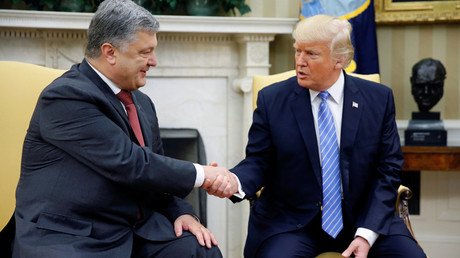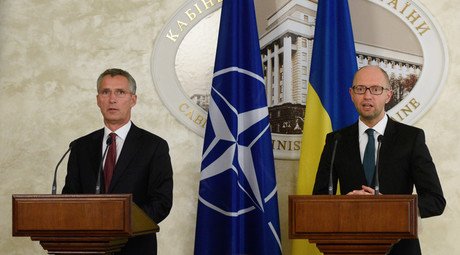NATO membership is Ukraine’s main foreign policy priority

Ukraine has officially set NATO membership as a key foreign policy goal, overturning the country’s non-aligned status adopted by the previous government ousted in the Euromaidan coup of 2014.
An amendment to Ukraine’s main law related to security was signed by President Petro Poroshenko on Thursday and officially came into force on Sunday.
The amendment, which was published in the Ukrainian Rada’s official Golos Ukrainy (Voice of Ukraine) newspaper, makes entry into “the Euro-Atlantic security realm… with the goal of becoming member of the North Atlantic Treaty Organization” a top priority.
Poroshenko, who has led the country since the Euromaidan coup removed President Viktor Yanukovich from power in 2014, wrote on his Facebook page that “Ukraine’s course towards NATO membership is now clearly stated as one of the key priorities for government policy.” He added that “an active effort to reform the security and defense sectors to comply with membership criteria now lies ahead.”
The amendment was backed by 276 of the 450 lawmakers in the Verkhovna Rada on June 8. The authors of the draft asserted that NATO membership will help Ukraine “strengthen national security, sovereignty and territorial integrity” and “stop Russian aggression,” as cited by Ukrinform media outlet.
Before 2014, Ukraine had been committed to a non-aligned status, meaning the country abstained from entering military alliances and strengthened ties with both Russia and the West. However, things changed dramatically after the coup, and the new government took a pro-Western course with overwhelming support from the Obama administration.
Kiev later unleashed a massive military operation against rebel forces in eastern Ukraine who rejected the coup in the capital. The intense hostilities have claimed the lives of at least 10,000 people, including civilians. Ukraine and its Western backers have accused Russia of supporting the rebels and violating Ukraine’s sovereignty.
READ MORE: Russia-NATO relations at worst point since Cold War – Moscow
Though Moscow has repeatedly dismissed the accusations as baseless, the US has imposed a wave of sanctions against Russia and sent instructors, as well as military aid, to Ukrainian troops fighting in the eastern part of the country. The UK and Canada followed suit shortly afterwards and sent “non-lethal” supplies to Kiev’s forces.
Kiev has taken numerous steps to engage in accession talks with NATO over the past few years, but the alliance has been wary of discussing the issue, even when relations between Russia and the West were at historic lows. NATO Secretary General Jens Stoltenberg said in March that it was up to Ukraine to pursue its NATO aspirations, but warned that its application would be considered carefully once submitted.
“That’s for Ukraine to decide whether they want to apply,” Stoltenberg told CNN in April. “And then if Ukraine applies, then it’s for 28 NATO allies to decide whether Ukraine qualifies,” he added.
As a rule, adopting new members requires unanimous support from all the members. An applying country must reform its military to comply with NATO standards, ensure the rule of law, and defeat corruption. Some independent analyses have suggested the latter may be difficult for Ukraine.
A recent report from the European Court of Auditors (ECA) featured a discouraging description of Ukraine, both before and after the so-called Maidan events.
“Ukraine’s state finances have deteriorated over the years, mainly due to mismanagement of public funds,” it said, adding, “despite reform efforts, Ukraine is still perceived as the most corrupt country in Europe… Oligarchic clans continue to exert a dominant influence on Ukraine’s economy, politics and media.”
European assessments aside, the Trump administration has also signaled a rethinking of previous US policies supporting Ukraine.














